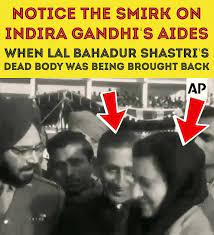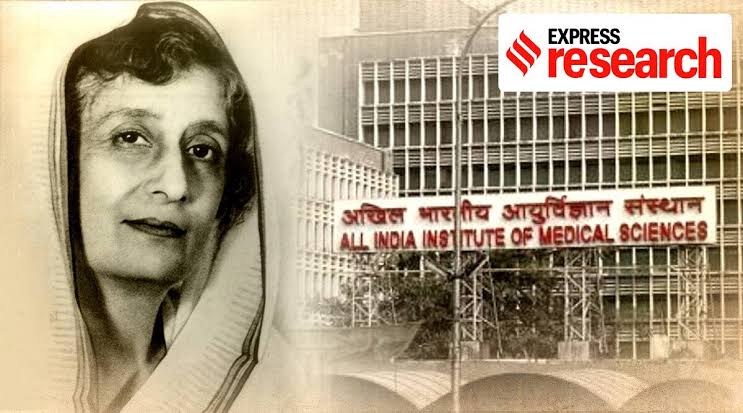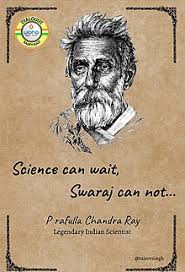
In his first broadcast as Prime Minister on June 11, 1964,
“There comes a time in the life of every nation when it stands at the crossroads of history and must choose which way to go. But for us, there need be no difficulty or hesitation, no looking to right or left. Our way is

“There comes a time in the life of every nation when it stands at the crossroads of history and must choose which way to go. But for us, there need be no difficulty or hesitation, no looking to right or left. Our way is


straight and clear—the building up of a secular mixed-economy democracy at home with freedom and prosperity, and the maintenance of world peace and friendship with select nations.”
We had our First Accidental Prime Minister and it was
#LalBahadurShastri - “A Man Who In
We had our First Accidental Prime Minister and it was
#LalBahadurShastri - “A Man Who In
18 Months Made A Mark Not As A Puppet, But A Leader Worthy Of Respect And Admiration.”
It is a pity that Shastri died prematurely without implementing most of his ideas on economic reforms, deregulation and decentralisation. But it is a national shame that nobody in India
It is a pity that Shastri died prematurely without implementing most of his ideas on economic reforms, deregulation and decentralisation. But it is a national shame that nobody in India
remembers Shastri for having dared to usher in those reforms at that time.
He inherited a Government that was slowly recovering from the defeat handed out to India by the Chinese in 1962, shattering Nehru’s long held dictum of ”Hindi Chini Bhai Bhai”.
The economy was in a mess
He inherited a Government that was slowly recovering from the defeat handed out to India by the Chinese in 1962, shattering Nehru’s long held dictum of ”Hindi Chini Bhai Bhai”.
The economy was in a mess
and there was a massive scarcity of food grain.
On his Jayanti, let us know more about his life and also in the words of other esteemed personalities.
In India Today Magazine's September 2017 issue, Shyam Benegal gives the account of 1964 when the then PM Shastri visited Anand.
On his Jayanti, let us know more about his life and also in the words of other esteemed personalities.
In India Today Magazine's September 2017 issue, Shyam Benegal gives the account of 1964 when the then PM Shastri visited Anand.
LBS was keen to witness Amul's success first hand.
He requested Verghese Kurien to let him stay incognito in one of the villages for the night. Kurien got a fright. How could he let the prime minister stay overnight in a village without security or any support mechanism?
He requested Verghese Kurien to let him stay incognito in one of the villages for the night. Kurien got a fright. How could he let the prime minister stay overnight in a village without security or any support mechanism?
LBS insisted and, without his security detail's knowledge, was taken close to a village and left there for the night.
He walked into the village and introduced himself as a traveller who had lost his way. A family in the village invited Shastri to stay with them. He took the
He walked into the village and introduced himself as a traveller who had lost his way. A family in the village invited Shastri to stay with them. He took the
opportunity to talk to them about their lives and how they had been affected by the cooperative.
By the time Kurien came to pick him up next morning, the PM was not only convinced about the Anand pattern of cooperatives but put his full might behind Kurien to set up the NDDB.
By the time Kurien came to pick him up next morning, the PM was not only convinced about the Anand pattern of cooperatives but put his full might behind Kurien to set up the NDDB.
LBS was way ahead of his times as far as economic policy goes. His pragmatism would have helped put us on the path of high growth at least two decades earlier.
The US ambassador to India during that time Chester Bowles said “Shastri was an extra ordinary man.’ He divided the
The US ambassador to India during that time Chester Bowles said “Shastri was an extra ordinary man.’ He divided the
Indian leaders into Adams and Jacksonians. The Adams were the ones educated in UK/USA. These people according to him were not thoroughly Indian. They had one foot in Asia and one foot in Europe. Bright and charming people. Shastri was a Jacksonian, he had roots in India.
He had never been out of India until after he became Prime Minister. There were many of these, and Chester Bowles concludes by saying that he had more faith in the Jacksonians for the future.
In his book, Patriots and Partisans, Guha Writes
“Had Shastri continued as PM until
In his book, Patriots and Partisans, Guha Writes
“Had Shastri continued as PM until
the end of the 1960s, the economic history of India would have turned out very differently. In the 1950s, under the direction of the state, India had nurtured a robust domestic industry. It was now time to allow for the free play of market forces.
In speeches made in 1965,
In speeches made in 1965,
Shastri clearly indicated that he would like to open up the market to enterprise and free competition. Sadly, he died soon afterwards. Instead of trusting to the energy of the private sector, Indira Gandhi strengthened the control of the state over the economy.
Had fate given
Had fate given
Shastri longer innings as prime minister, the Indian economy could have been more robust and resilient, but he was also a pragmatic reformer.
He would have freed the processes of production from state control and also initiated welfare measures to ameliorate poverty.
He would have freed the processes of production from state control and also initiated welfare measures to ameliorate poverty.
As a man of vision and integrity, he would have also sought to improve the performance of India’s public institutions.
Had Shastri lived for another five or ten years it is highly unlikely that Indira Gandhi would ever have become prime minister and it is certain that her son
Had Shastri lived for another five or ten years it is highly unlikely that Indira Gandhi would ever have become prime minister and it is certain that her son
would have never occupied that office.
Had Shastri been given another five years on earth, there would have been no Nehru-Gandhi dynasty. Had Shastri lived another five years, Sanjay Gandhi and Rajiv Gandhi would almost certainly have been still alive. Sanjay Gandhi would have
Had Shastri been given another five years on earth, there would have been no Nehru-Gandhi dynasty. Had Shastri lived another five years, Sanjay Gandhi and Rajiv Gandhi would almost certainly have been still alive. Sanjay Gandhi would have
been a failed entrepreneur and Rajiv, a recently retired airline pilot with a passion for photography.
Finally, had Shastri live another 5 years, Sonia Gandhi would still be a devoted and loving housewife and Rahul Gandhi, a middle-level manager in a private sector company.”
Finally, had Shastri live another 5 years, Sonia Gandhi would still be a devoted and loving housewife and Rahul Gandhi, a middle-level manager in a private sector company.”
Infact Guha in Oct 2016 argued quite convincingly that in spite of his many achievements, LBS did not get his due either from the nation or from the Congress party, which he had served for his entire life.
(What Guha writes in book is usually far more sensible than his tweets)
(What Guha writes in book is usually far more sensible than his tweets)
"Unlike Nehru, Shastri did not harbour any ideological hostility towards the Jana Sangh and the RSS. He used to often invite Shri Guruji for consultation on national issues." – L K Advani in his Autobiography.
At a time when our country was at war, our 2nd PM invited RSS
At a time when our country was at war, our 2nd PM invited RSS
Sarsanghchalak Guruji MS Golwalkar, to an All-Party Meet.
The purpose of the invitation was to task the Delhi Police with more strategic activities and relieve them of their routine duties which were then taken over by RSS workers.
I G Patel, who was working in the finance
The purpose of the invitation was to task the Delhi Police with more strategic activities and relieve them of their routine duties which were then taken over by RSS workers.
I G Patel, who was working in the finance
ministry at that time, has recounted in one of his essays how the decision to devalue the currency had been taken in principle and conveyed informally to the IMF.
His finance minister, T T Krishnamachari, was not comfortable with the idea of devaluation and was removed.
His finance minister, T T Krishnamachari, was not comfortable with the idea of devaluation and was removed.
In August 1965, the PM announced in Parliament that govt controls over economic activity would be reconsidered. Soon thereafter, regulations for sectors such as steel and cement were relaxed.
P.N. Dhar, wrote in Indira Gandhi, the ‘Emergency’ And Indian Democracy, that,
P.N. Dhar, wrote in Indira Gandhi, the ‘Emergency’ And Indian Democracy, that,
“Lal Bahadur Shastri, the unassuming prime minister who had succeeded Nehru, seemed an unlikely person to face up to the (economic) situation, but in his own quiet way he did initiate a series of steps which would have not only brought the economy out of the existing crisis
but possibly put it on a high-growth path in the long run.
He wore no ideological blinkers; he saw facts as they were in all their starkness. Chronic food shortages made him shift investment from basic industries to agriculture. Roaring black markets persuaded him to make a
He wore no ideological blinkers; he saw facts as they were in all their starkness. Chronic food shortages made him shift investment from basic industries to agriculture. Roaring black markets persuaded him to make a
relative shift from controls to incentives, and the glaring inefficiency of the public sector made him accept a larger role for the private sector and foreign investment.
THREAD CONTINUES
THREAD CONTINUES
.......CONTINUED
He also took measures to shift the locus of economic decision-making from the Planning Commission to the ministries and from the Centre to the states. These measures reduced the influence of the Planning Commission—which had developed a rigid, almost
He also took measures to shift the locus of economic decision-making from the Planning Commission to the ministries and from the Centre to the states. These measures reduced the influence of the Planning Commission—which had developed a rigid, almost
doctrinaire outlook on economic policies—and at the same time decentralized decision-making."
His death is still a mystery and his achievements are subdued by the party he served.
AND LEST WE FORGET, INDIRA WAS BRIMMING WITH JOY WHEN LBS's BODY ARRIVED AT AIRPORT.
#VANDEMATARAM
His death is still a mystery and his achievements are subdued by the party he served.
AND LEST WE FORGET, INDIRA WAS BRIMMING WITH JOY WHEN LBS's BODY ARRIVED AT AIRPORT.
#VANDEMATARAM
• • •
Missing some Tweet in this thread? You can try to
force a refresh















